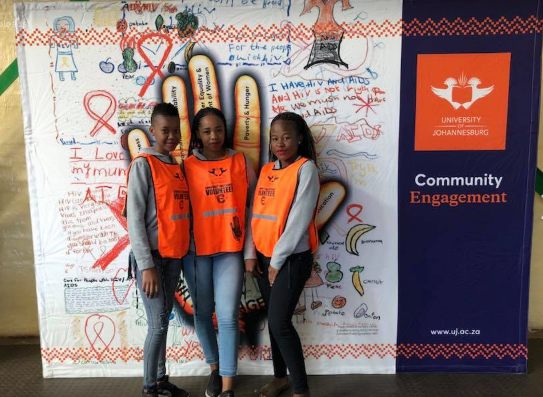.png?width=855&height=238&name=2018AR-logo2%20(1).png)
Planet Aid's annual reports are now published online to help save resources.
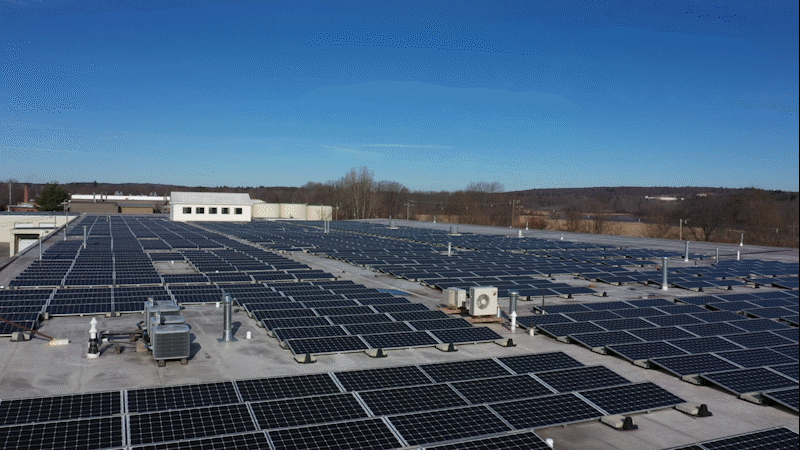
Table of Contents:
- From the President and the CEO
- Results Overview
- Projects
- Planet Aid at Home
- People at Planet Aid
- Financial Statement
From the President and the CEO
From Planet Aid's President — Ester Neltrup
Planet Aid has supported many development projects over its long tenure. One of the earliest projects we assisted is the Child Aid project in Doornkop, South Africa.
Doornkop is an area on the outskirts of Johannesburg where the poor have long taken refuge. The area was first known as “Snake Park,” because it was a wild, undeveloped place of thorn bushes and snakes. As Johannesburg and its suburbs grew, so did Snake Park. With time, it became known as “Silver Town,” because of its large number of silvery tin shanty roofs. Doornkop (the official name today) means “thorn hill” in Afrikaans. It is a place for those with nothing, a place of hardship.
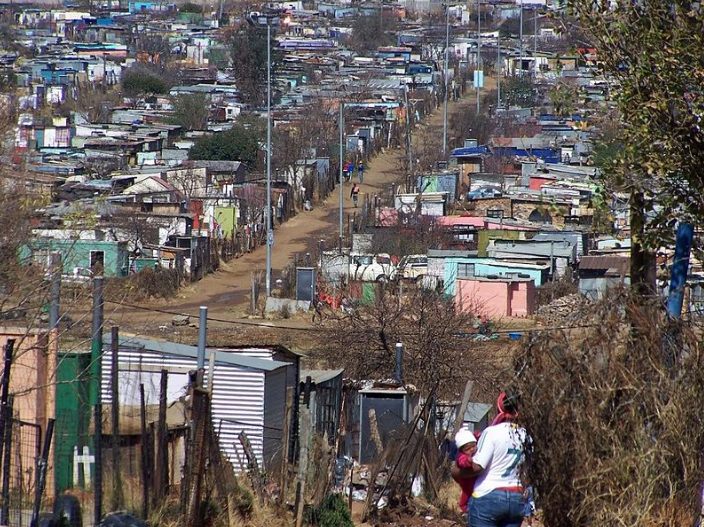
The Child Aid project in Doornkop is implemented by Planet Aid's sister organization Humana People to People South Africa. As the name implies, Child Aid seeks to improve conditions that allow children to grow and thrive, giving them a chance at a better life. Because of the diseases that have afflicted the area (mainly HIV/AIDS) orphans are ever-present in Doornkop. Today, thanks to Child Aid’s work, children have hope. For example, there are 30 new preschools in Doornkop and better sanitation and health facilities for all, among other improvements.
Child Aid is not just focused on children, but also on parents, caregivers, and other adults. For example, the project assists job seekers in creating a resume and finding employment. No matter the activity, Child Aid seeks to create momentum for development through a sense of shared destiny with those it serves. It is this type of mobilization strategy that has contributed to the success of the project over time.
Child Aid Doornkop was recently recognized by researchers at the University of Johannesburg's Centre for Social Development in Africa (CSDA). Centre staff spent years working with Child Aid participants at Doornkop, and recently published a book of research called Development, Social Policy and Community Action.
The authors came to learn that Child Aid embraced a unique understanding and respect for the community. “This was an international NGO, integrated in the community, providing good services,” wrote Tessa Hochfeld, CSDA associate professor. “The staff understood the community; they were very grassroots, with local people working in their local community, but also with good accountability.”
In 2018, Child Aid Doornkop celebrated its twentieth anniversary. Planet Aid is proud of having supported this project for so many years. We know that progress does not come easy and, while some escape poverty, others arrive to take their place. The work goes on.
I want to sincerely thank all of our donors and supporters for standing with us to help the poor in Doornkop and everywhere else that we have been providing assistance over the years. Without their contributions, we could not be a part of this vital work.
In closing, I want to announce that after decades as Planet Aid's CEO, I have decided to step down. However, I will continue in my role as president of the board. I also want to introduce Fred Olsson, Planet Aid's new CEO. Fred has been the chief operations officer for many years. He will do a great job leading Planet Aid in his new capacity.
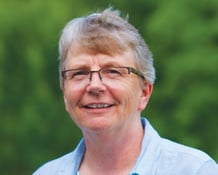
Ester Neltrup
President
From Planet Aid's CEO — Fred Olsson
.jpg?width=300&height=379&name=greta-small%20(2).jpg) In the summer of 2018, a Swedish ninth grader named Greta Thunberg took a stand for the climate. Instead of going to school, she sat outside the Swedish parliament holding a sign that read: Skolstrejk för klimatet (translated: school strike for climate).
In the summer of 2018, a Swedish ninth grader named Greta Thunberg took a stand for the climate. Instead of going to school, she sat outside the Swedish parliament holding a sign that read: Skolstrejk för klimatet (translated: school strike for climate).
Thunberg explained to passersby that she would not attend school until the general election, and criticized the Swedish government for not caring about the worsening climate. She was deliberately breaking the law by skipping school to draw attention to the problem of global warmimg.
Outspoken and committed, Thunberg became an international sensation. Her climate strike swelled to 1.5 million participants around the globe. She made speeches at the United Nations climate summit in Poland and at the World Economic Forum in Davos, Switzerland. Being true to her purpose, she refused to fly anywhere and traveled only by train so as to reduce her climate footprint.
Meanwhile, in the United States, 17-year-old Jamie Margolin was busy organizing a nationwide youth protest. Margolin, a climate activist since she was 14, mobilized the new Zero Hour movement to raise awareness and stop climate change. The group's massive march on July 21st demanded that the government take action, including divesting from the fossil fuel industry.
These two young activists, continents apart, are the vanguard of a generation that will not stand idly by while the Earth is destroyed. Their courage and commitment are an inspiration, and they could not be more right in doing what they are doing.
The need for evasive action to stop climate change is more urgent than ever. With every month that passes the news grows more dire. The climate is careening out of control toward a cliff of no return. We must slam the brakes on carbon emissions before it is too late.
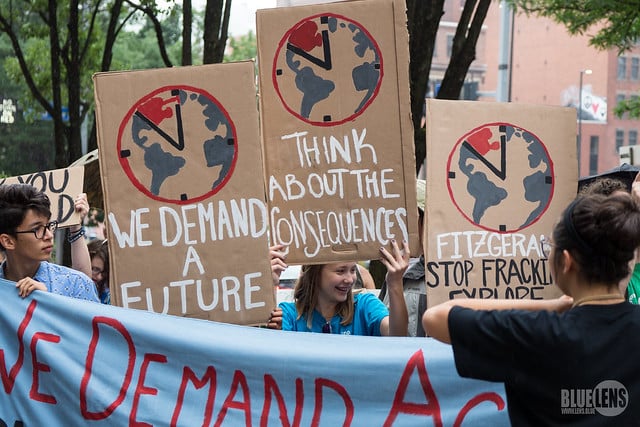
Photo by Mark Dixon, Creative Commons
At Planet Aid, we are doing all we can to help save textile resources and reduce their environmental impact. Clothing consumption has exploded over the past few decades, being driven by the phenomenon of fast fashion. The fashion industry has become one of the most polluting on the planet, emitting about 1.2 billion tons of carbon annually, more than the airline and maritime industries combined.
It is vital that we extend the life of clothing through greater reuse and recycling. The U.S. EPA estimates that the 2.6 million tons of textiles that are diverted from the waste stream annually saves 6.2 million metric tons of carbon from entering the atmosphere, which is the equivalent of taking 1.2 million cars off the road.
About 14 million tons of textiles are still being needlessly thrown away in the U.S. annually. If we were to save this additional tonnage, it would be the equivalent of taking another 7 million cars off the road. Join us in making this savings a reality. Find a Planet Aid bin near you and donate your textiles today!
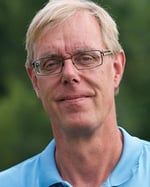
Fred Olsson
CEO
2017 in Review
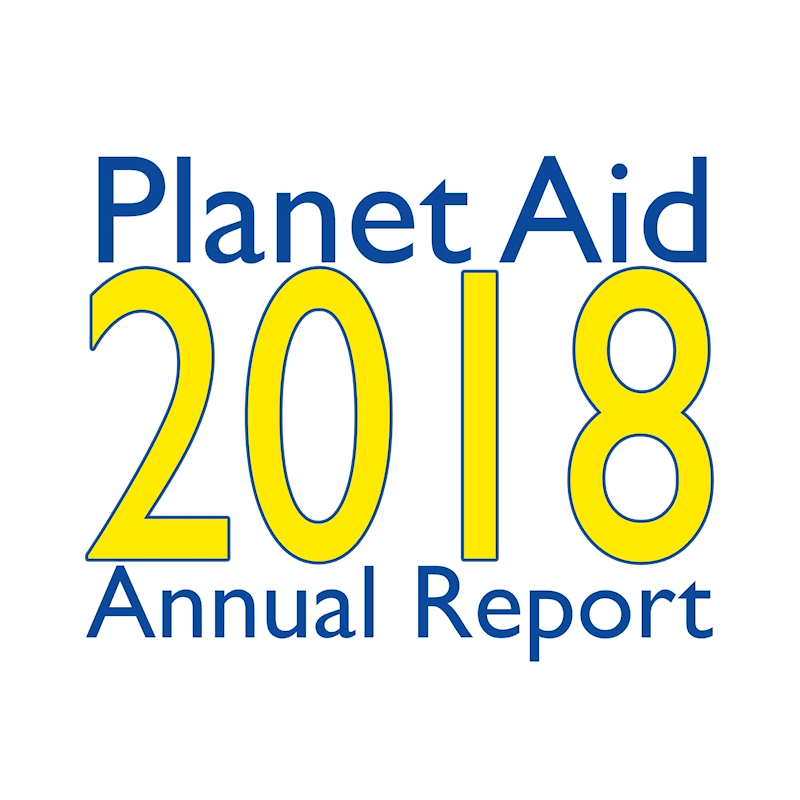
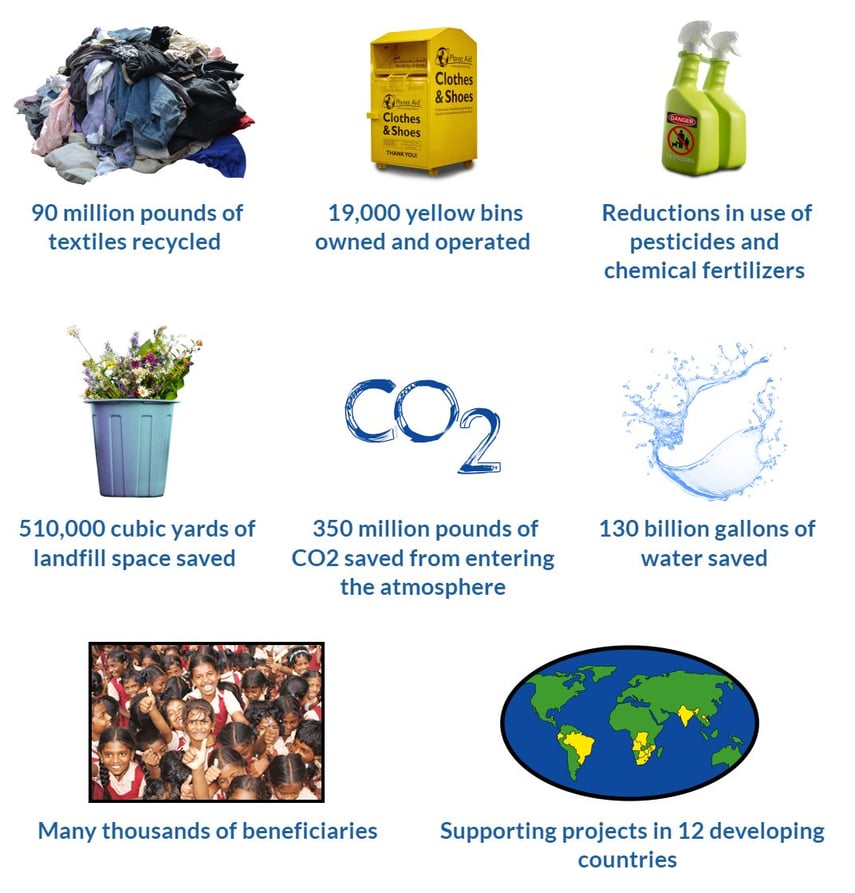
International Projects
For the Environment
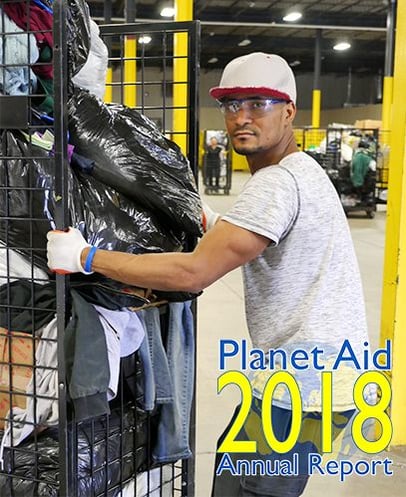 In the United States, Planet Aid helped divert more than 90 million pounds of clothing and other textile materials from disposal, thus saving resources for reuse and recycling. Clothing that is disposed of in landfills releases methane, a potent greenhouse gas. Clothing that is instead reused not only reduces landfill burdens but reduces the need to produce new textile fibers and manufacture new clothing—a resource intensive process requiring large inputs of fossil fuels, water, fertilizer, and pesticides. Reusing clothing thus saves resources and reduces harmful environmental impacts, including reductions in harmful emissions that contribute to climate change.
In the United States, Planet Aid helped divert more than 90 million pounds of clothing and other textile materials from disposal, thus saving resources for reuse and recycling. Clothing that is disposed of in landfills releases methane, a potent greenhouse gas. Clothing that is instead reused not only reduces landfill burdens but reduces the need to produce new textile fibers and manufacture new clothing—a resource intensive process requiring large inputs of fossil fuels, water, fertilizer, and pesticides. Reusing clothing thus saves resources and reduces harmful environmental impacts, including reductions in harmful emissions that contribute to climate change.
Read more about our recycling efforts.
For People
For more than two decades, Planet Aid has been supporting development projects that help fight poverty. Through the funds generated by collecting and selling used clothing and by receiving support from public and private donors, Planet Aid has been able to provide life-changing, sustainable assistance to those in need. Below is an overview of the projects we supported in 2018.
Locations of Development Projects
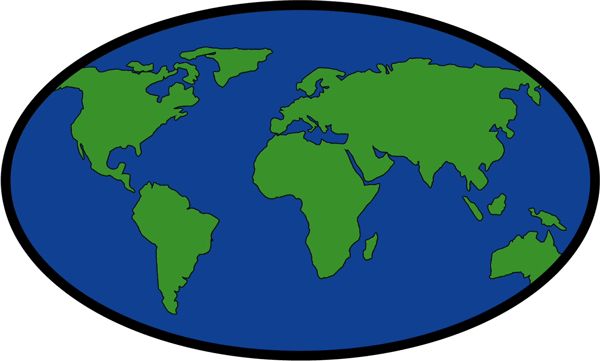
| Angola | Democratic Republic of the Congo | Malawi |
| Belize | Ecuador | Mozambique |
| Botswana | Laos | South Africa |
| Brazil | India | Zimbabwe |
Types of Projects We Support
Education • Community Development • Health
Food and Nutrition • Sustainable Agriculture
Education
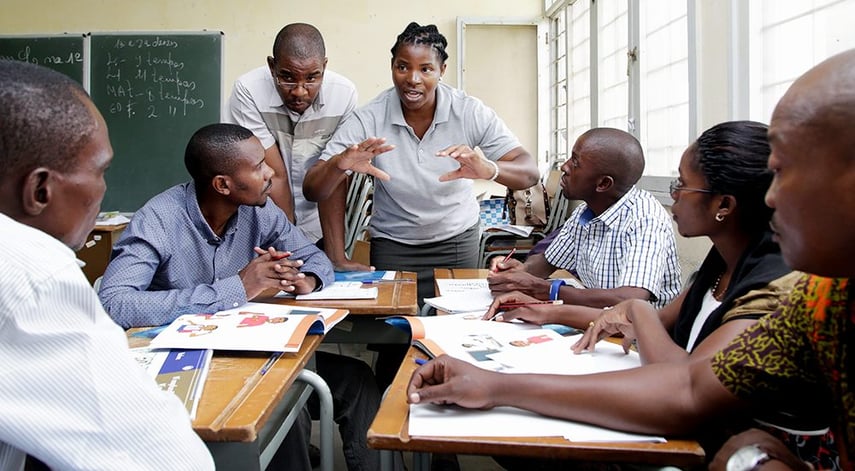
Teacher Training
Countries: Angola, the Democratic Republic of the Congo, India, Malawi, Mozambique
To escape from the cycle of poverty, children in low-income countries need more opportunities to obtain an education. Unfortunately, qualified and skilled teachers for primary schools are in short supply, resulting in challenging class sizes with upward of 100 students per class.
In 2018, Planet Aid donated funds to support training new primary school teachers at 14 colleges in India and 3 African nations. The philosophy of the colleges, which follow the DNS methodology, emphasizes innovation and self-reliance. Students plan their course of study within a given framework. For example, approximately a quarter of their time involves learning outside the classroom, including an extended field trip to rural areas to acquire a deeper understanding of what challenges face those who live in poverty.
Teachers in low-income countries frequently work in schools with scarce materials and limited facilities. The DNS approach prepares teachers to create exciting learning environments, despite the challenges of teaching in schools that sometimes lack even a roof or walls, let alone teaching supplies.
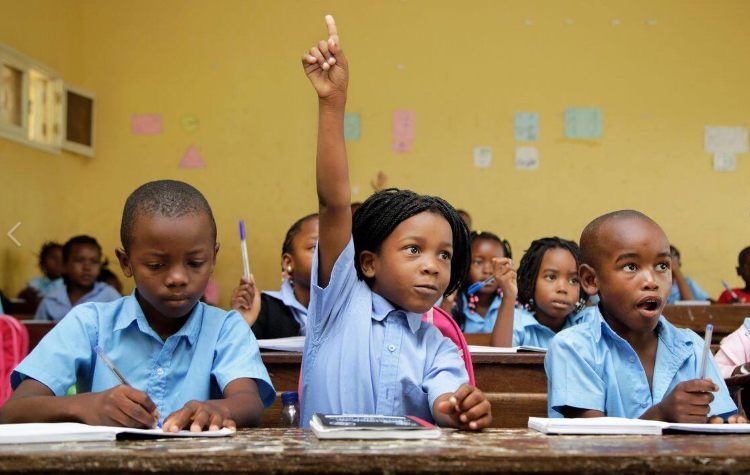
In addition, teachers are also trained in how to effectively engage with the community and become local development activists. This approach recognizes that learning is contextual and that to be effective, teachers must sometimes go beyond the classroom walls to gain support and achieve results.
For example, Sarah—a graduate of the Planet Aid-supported teacher-training college in the Democratic Republic of the Congo—teaches at Mankengho Primary School about 50 miles from Mbankana. The principal at her school, Isaac Kudiabuna, has observed Sarah’s unique commitment to helping students.
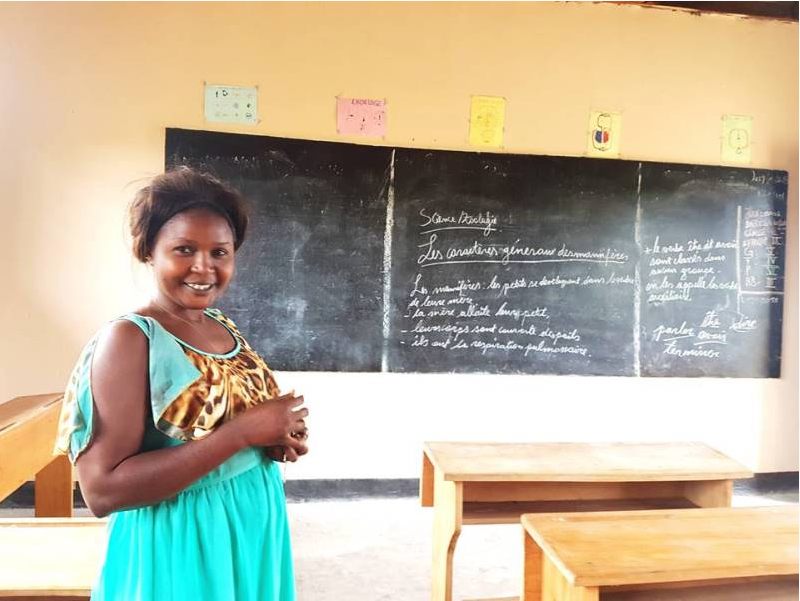
“At the beginning of the school year, Sarah went from door to door to mobilize parents to send their children to school,” he writes, “which has resulted in an increase in the number of children enrolled in our school.”
In addition to her teaching duties, Sarah has been involved in helping local women become more empowered. She organized a local association with 80 members, primarily female, and is facilitating their growing cassava to generate more income. Sarah also created a nursery of acacia seedlings to help regenerate the village forest that had been cut down to generate charcoal.
Like Sarah, the graduates from the other Planet Aid–supported teacher-training colleges are similarly prepared to mobilize the local community and help spur initiatives to improve the condition of people’s lives.
In 2018, the colleges Planet Aid supports graduated 1,500 new teachers.
Read more about Teacher Training.
Kadam Step-Up Center
Countries: India
.jpg?width=300&height=231&name=Step-Up-Centers-e2%20(1).jpg) The Kadam Step-Up Centers in India—created and operated by Planet Aid’s sister organization Humana People to People India—are helping the country's disadvantaged families. The centers offer a way for children who have never attended school, or who have dropped out, with “bridge education,” helping them “step up” to meet the demands of regular public education. Nearly 6 million children are out of school in India. Many of those children haven’t had the opportunity to obtain an education due to a lack of funding, a lack of legal documentation, or other factors.
The Kadam Step-Up Centers in India—created and operated by Planet Aid’s sister organization Humana People to People India—are helping the country's disadvantaged families. The centers offer a way for children who have never attended school, or who have dropped out, with “bridge education,” helping them “step up” to meet the demands of regular public education. Nearly 6 million children are out of school in India. Many of those children haven’t had the opportunity to obtain an education due to a lack of funding, a lack of legal documentation, or other factors.
Kadam children enroll for a one-year program to catch up on learning at their age-appropriate level and at their own pace. It is a blending of formal learning and skill-based experiences, engaging children for six days a week.
The Step-Up Center’s curriculum covers mathematics, science, English, along with other subject requirements established by the Government of India. Some of the centers also offer computer courses for the students. The Kadam methodology is also used in remedial education programs in the state of Tamil Nadu for girls from grades 2-8 who are at high risk of dropping out of school.
In 2018, 338 Planet Aid–supported Kadam centers assisted more than 19,000 children, and approximately 9,000 made the transition to regular schools.
Read more about Kadam Step-Up Centers.
Food for Knowledge
Countries: Mozambique
.jpg?width=300&height=225&name=DSCF3939-2%20(1).jpg) Food for Knowledge (FFK), is Planet Aid’s comprehensive nutrition and education initiative funded by the U.S. Department of Agriculture as part of the McGovern-Dole International Food for Education and Child Nutrition Program.
Food for Knowledge (FFK), is Planet Aid’s comprehensive nutrition and education initiative funded by the U.S. Department of Agriculture as part of the McGovern-Dole International Food for Education and Child Nutrition Program.
In addition to providing daily meals for 86,000 students, the project also focuses on improving local education by training primary school teachers, creating after-school learning clubs, building literacy skills, and providing training in good nutrition.
FFK’s newest component is the bilingual early grade reading program. This component is helping children learn to read and write in their local languages. FFK, in partnership with Cambridge Education, ADPP Mozambique, and the Government of Mozambique, developed early grade reading materials in two local languages used by the children. This has helped to remove a key obstacle of having to first learn to read in Portuguese (the language traditionally used in schools and less familiar to most students). Additionally, more than 163,000 textbooks and other teaching and learning materials were distributed.
Read more about Food for Knowledge.
Girls Inspire
Countries: Mozambique
.jpg?width=300&height=200&name=Girls-Inspire-e%20(1).jpg) Some of the projects Planet Aid supports specifically address gender issues that affect young girls and women in the developing world. The “Girls Inspire” project in Mozambique was among these projects—an initiative of the Commonwealth of Learning to help women and girls who are either at risk of or have become victims of forced child marriages.
Some of the projects Planet Aid supports specifically address gender issues that affect young girls and women in the developing world. The “Girls Inspire” project in Mozambique was among these projects—an initiative of the Commonwealth of Learning to help women and girls who are either at risk of or have become victims of forced child marriages.
The project—which worked in Nacala, a port city in Northern Mozambique, until the project's end in December 2018—addressed the barriers that prevent women and girls’ independence and empowerment. The project was based on the premise that gender equality is a right and that providing learning opportunities for vulnerable women and girls can help achieve sustainable development. Mozambique has one of the world’s highest rates of child marriages; 48 percent of girls are married before they turn 18. It is also one of the world’s least developed countries.
Girls Inspire focused on girls who were out of school and provided them with better access to education, including the development of life skills, employment, and entrepreneurial skills. In 2018, more than 1,400 women and girls were enrolled and graduated from three-month vocational courses at the Institute for Vocational Training and Professional Development, operated by Planet Aid’s sister organization ADPP Mozambique.
In addition, the Girls Inspire project reached over 4,500 women and girls in 2018 through its educational support and awareness campaigns. It hosted 152 community events and trained 56 teachers in gender-sensitive support. Girls Inspire was implemented in partnership with the Commonwealth of Learning and was funded by the Government of Canada, Planet Aid, and other partners.
Nikhalamo Girls Stay in School Project
Countries: Mozambique
.jpg?width=300&height=450&name=Nikhalamo-e%20(1).jpg) Forced marriage, teen pregnancy, and socio-cultural norms that frown on female education are among the factors that put pressure on young girls in Mozambique to drop out of school. In the Zambezia Province of Mozambique, 40 percent of girls are pregnant before the age of 18, and only 4 percent of girls complete junior secondary school (grades 8-10).
Forced marriage, teen pregnancy, and socio-cultural norms that frown on female education are among the factors that put pressure on young girls in Mozambique to drop out of school. In the Zambezia Province of Mozambique, 40 percent of girls are pregnant before the age of 18, and only 4 percent of girls complete junior secondary school (grades 8-10).
The Nikhalamo project, implemented by ADPP Mozambique in partnership with Girl Child Rights and funded by USAID with supplementary support from Planet Aid, is helping girls in the Zambezia Province complete their education. "Nikhalamo" in the local Chuabo language means “I am here to stay.” The project’s name affirms the aim to reduce obstacles for girls transitioning from primary school to secondary school to ensure that they stay in school.
The project has three main goals: first, to improve girls’ school retention and performance rates; second, to transform learning environments by improving water and sanitation and promoting gender equality; and third, to build a community-led support system for the girls, which includes mentoring in life skills and moral support. The project supported approximately 5,000 vulnerable girls in 2018 alone, who were aided by girl education promoters and girl mentors and by training teachers in gender sensitivity. Other activities included building latrines and distributing sanitary pads. It also paid the school registration fees for nearly 1,300 girls who were either orphans or otherwise vulnerable.
Read more about the Nikhalamo Girls Stay in School Project.
Ponesai Vanhu Junior School
Countries: Zimbabwe
.jpg?width=300&height=225&name=Ponesai-Vanhu-e%20(1).jpg) The Ponesai Vanhu Junior School was established in 1994 in Zimbabwe to provide shelter, education, and support for orphaned and vulnerable children (age 18 and under) who experienced hardship in their lives. The school offers children a supportive, nurturing environment and helps them heal and find their way toward a better life.
The Ponesai Vanhu Junior School was established in 1994 in Zimbabwe to provide shelter, education, and support for orphaned and vulnerable children (age 18 and under) who experienced hardship in their lives. The school offers children a supportive, nurturing environment and helps them heal and find their way toward a better life.
Ponesai Vanhu provides the basics for a stable and healthy life with food and nutrition, clothing, medical attention, and psycho-social support. The school is operated by Planet Aid's sister organization Development Aid from People to People Zimbabwe.
During 2018, the school housed 56 children.
Read more about the Ponesai Vanhu Junior School.
Vocational and Skills Training
Countries: Angola, Mozambique, Zimbabwe
.jpg?width=726&height=572&name=0ca4b7c0975ea25d71c58154afc48d3078b7cad307e1f86e727e0bdbcabc7207-copy%20(1).jpg)
Planet Aid supports four vocational schools, which enroll students from grades 7 to 9, between 13 and 18 years old. Students are able to complete two-year courses of study in a number of different disciplines, depending on what is offered at each school (there are also shorter three-month courses available at some schools). For example, in Mozambique students may be enrolled in civil construction or business administration, whereas in Zimbabwe the training options include cosmetology and motor mechanics. No matter the specialty, the vocational programs also cover the basics, such as: mathematics, reading and composition, biology, chemistry, and other subjects.
In 2018, the vocational schools Planet Aid helped support had a combined population of more than 700 students.
Read more about vocational and skills training.
Frontline Institute
Countries: Zimbabwe
.jpg?width=300&height=156&name=Frontline%20(1).jpg) Frontline Institute was established in 1993 with the aim of providing a unique educational opportunity for youth from Southern Africa. Today, students also arrive from as far away as Ecuador and Brazil to attend the Frontline program.
Frontline Institute was established in 1993 with the aim of providing a unique educational opportunity for youth from Southern Africa. Today, students also arrive from as far away as Ecuador and Brazil to attend the Frontline program.
The training is focused on creating a dedicated cadre of development professionals and world citizens, and cultivating a passion for making the world a better place. Over it’s more than 25-year history, Frontline has trained more than 5,000 students, with most working as leaders within the Humana People to People Federation (of which Planet Aid is a member). In 2018, Frontline trained 183 students.
One World University
Country: Mozambique
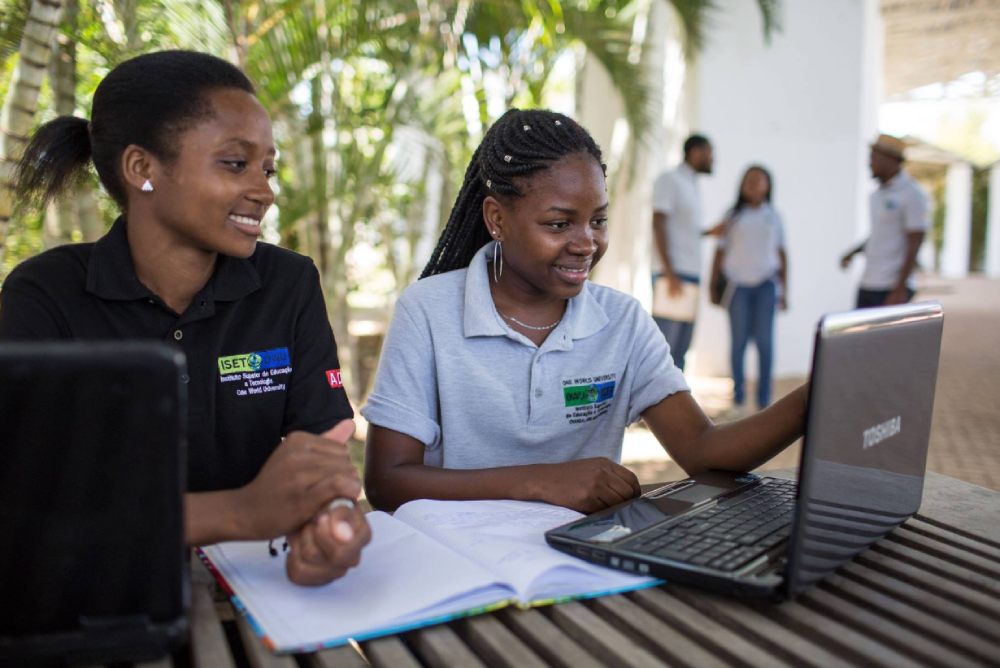
One World University in Mozambique is a Planet Aid–supported four-year institution of higher education operated by Planet Aid's local partner Ajuda de Desenvolvimento de Povo para Povo (ADPP Mozambique). At OWU students have the option of undertaking courses in either pedagogy or community development.
The pedagogy option prepares students for a career in education, whether as instructors at a teacher-training college or for other positions within the field. Combining classroom instruction with independent study and high-levels of hands-on teaching experience, OWU inspires students to learn all that they can. In the process, they discover first hand that learning must be made relevant and enjoyable, so that children feel positive about attending—and remaining—in school. Graduates also understand the importance of involving parents and the community, and how to foster a positive environment that places a high value on obtaining an education.
The community development course shapes students into critical thinkers and local activists who can tackle development challenges common to rural areas. Graduates are prepared to assess community needs and to mobilize individuals to carry out initiatives that can vary from health and education to agricultural productivity and mitigation of the effects of climate change.
In 2018, more than 200 students were in training at the OWU campus in Mozambique, and an additional 460 students were completing their studies through the university’s distance learning program. The OWU campus in Changalane, 80 km from the capital Maputo, was built with the assistance of Planet Aid and with support from the U.S. Department of Agriculture, EDULINK, and the Finnish Ministry of Foreign Affairs.
Community Development
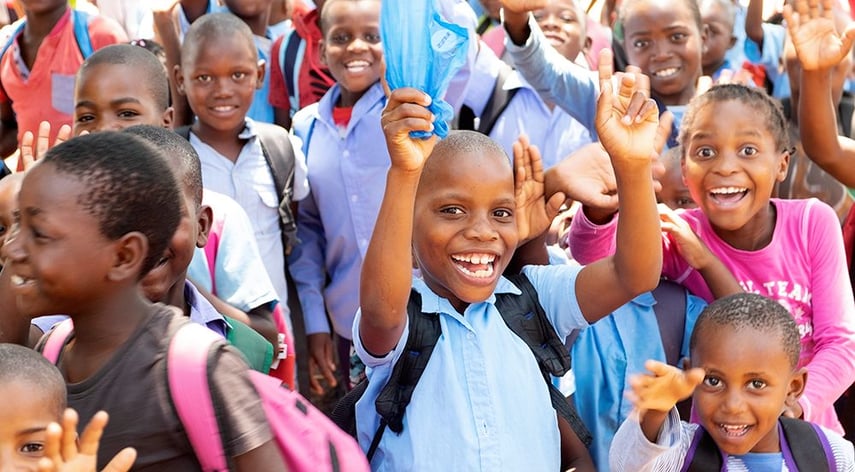
Child Aid Projects
Countries: Belize, the Democratic Republic of the Congo, Ecuador, South Africa, Zimbabwe
.jpg?width=300&height=225&name=Belize-Child-Aid%20(1).jpg) Child Aid projects are community-based initiatives that use a holistic approach to mobilize residents into confronting and working toward resolving community problems. The goal is to improve living conditions and thus achieve a healthy and nurturing environment for children.
Child Aid projects are community-based initiatives that use a holistic approach to mobilize residents into confronting and working toward resolving community problems. The goal is to improve living conditions and thus achieve a healthy and nurturing environment for children.
The projects empower communities with essential skills in the areas of health, water and sanitation, education, agriculture and food security, income generation, environmental awareness, and childhood development.
While the goals of all Child Aid projects are the same, the implementation varies greatly between each project location. The projects seek to address specific problems within each community and serve as a tool in expanding the capacity of the residents to solve their own problems.
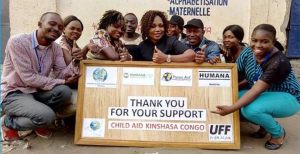 For example, the agro-based community in Rushinga, Zimbabwe was affected by a severe farming season drought, leaving 1,200 families without enough food. To address this, the Rushinga Child Aid project supported the development of nutritional gardens and introduced sustainable agricultural methods like the use of organic manure and natural pesticides.
For example, the agro-based community in Rushinga, Zimbabwe was affected by a severe farming season drought, leaving 1,200 families without enough food. To address this, the Rushinga Child Aid project supported the development of nutritional gardens and introduced sustainable agricultural methods like the use of organic manure and natural pesticides.
Overall, in 2018, Child Aid projects supported by Planet Aid vaccinated more than 2,000 children, trained almost 4,000 young adults in financial literacy, established 840 gardens, planted over 20,000 trees, distributed almost 200,000 condoms, and much more. The combined projects impacted over 33,000 families.
Health
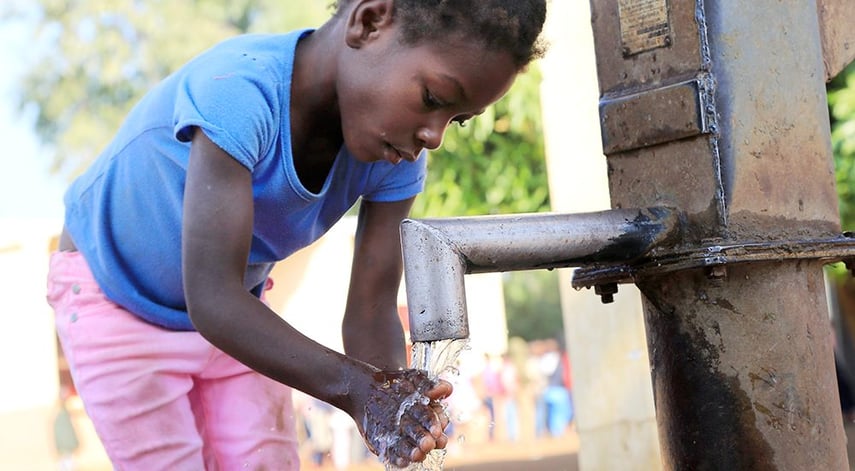
Malaria Prevention and Treatment
Countries: Mozambique, Zimbabwe
.jpg?width=300&height=331&name=Moz-Malaria-e2%20(1).jpg) In 2017, eight Southern African countries launched Elimination 8, a regional, cross-border, malaria prevention and treatment program. The program was funded by numerous donors and covered Botswana, Mozambique, Namibia, South Africa, Swaziland, Zambia, and Zimbabwe.
In 2017, eight Southern African countries launched Elimination 8, a regional, cross-border, malaria prevention and treatment program. The program was funded by numerous donors and covered Botswana, Mozambique, Namibia, South Africa, Swaziland, Zambia, and Zimbabwe.
DAPP Zimbabwe, who receives support from Planet Aid, was among the Elimination 8 providers, establishing five mobile health stations, which became permanent stations also delivering primary health care services. Additional primary health services include: pre- and post-natal services, treatment of minor illnesses, and referrals to hospitals for other services.
Outside of the Elimination 8 program, Planet Aid also supported the Malaria Prevention Project in Mozambique. Implemented by ADPP Mozambique, this project helps reduce the malaria burden in the provinces of Nampula and Niassa, in partnership with the Ministry of Heath’s National Malaria Program. This project helps communities take control of malaria by mobilizing the communities to strive for early detection and treatment through use of health centers. In 2018, the overall level of achievement of the target goals was close to 100 percent.
Over 460,000 people were reached through the two projects, with thousands of cases treated. Along with detection and treatment, the projects carried out malaria education campaigns and distributed mosquito nets.
Total Control of the Epidemic
Countries: Laos, Malawi
.jpg?width=300&height=258&name=TC-TB-Malawi-e%20(1).jpg) Total Control of the Epidemic (TCE) is an intervention model to help control major epidemics, such as HIV/AIDS, tuberculosis (TB), and malaria, that afflict communities in lesser developed countries.
Total Control of the Epidemic (TCE) is an intervention model to help control major epidemics, such as HIV/AIDS, tuberculosis (TB), and malaria, that afflict communities in lesser developed countries.
In 2018, the TCE projects Planet Aid supported focused on fighting TB in Laos and Malawi. These projects go by the abbreviation: TC-TB.
Laos has one of the highest disease burdens in Southeast Asia. Planet Aid’s sister organization, Humana People to People Laos, has been implementing a TB prevention project in two rural districts of the Bolikhamxay Province. Awareness of TB is very low in rural Laos and the project has focused on educating communities on the signs and symptoms of TB and encouraging them to get screened. More than 12,000 individuals were screened in 2018, and a total of 7 cases of TB were confirmed.
In Malawi, the TC-TB project came to an end in April. It had been working in Thylolo District and had reached over 8,000 individuals through door-to-door visits. More than 800 people had been screened.
HOPE
Countries: Botswana, South Africa
.jpg?width=300&height=209&name=hope2%20(1).jpg) HOPE is a project aimed at reducing the spread of HIV/AIDS that also offers care and support to victims. The project plays an important role in helping to regain quality of life for those infected or otherwise affected by the disease and to restore their hope for the future. HOPE provides HIV/AIDS in-home testing, referral for treatment, condom distribution, support groups, psychological support, awareness education in schools, and establishes food gardens and nutrition centers.
HOPE is a project aimed at reducing the spread of HIV/AIDS that also offers care and support to victims. The project plays an important role in helping to regain quality of life for those infected or otherwise affected by the disease and to restore their hope for the future. HOPE provides HIV/AIDS in-home testing, referral for treatment, condom distribution, support groups, psychological support, awareness education in schools, and establishes food gardens and nutrition centers.
HOPE’s basic approach is to establish a center in the community as a base for community mobilization and support for those affected, and from which house-to-house visits are launched to increase prevention behavior.
Domestic violence is among the issues addressed by HOPE centers and is in many ways related to HIV infection. To meet this threat head on and shine a bright light on this destructive behavior, the HOPE project organizes meetings and facilitates discussions in the community that focus on harmful gender norms and other factors that lead to gender-based violence. In Botswana, for example, these meetings were well attended. The target for people to attend meetings was 500 in 2018, but nearly 800 were reached by the campaign.
Overall, in 2018, the three Planet Aid-supported HOPE projects in Botswana and South Africa reached 160,000 people, testing 65,000 for HIV/AIDS and distributing more than 1.5 million condoms.
Food and Nutrition
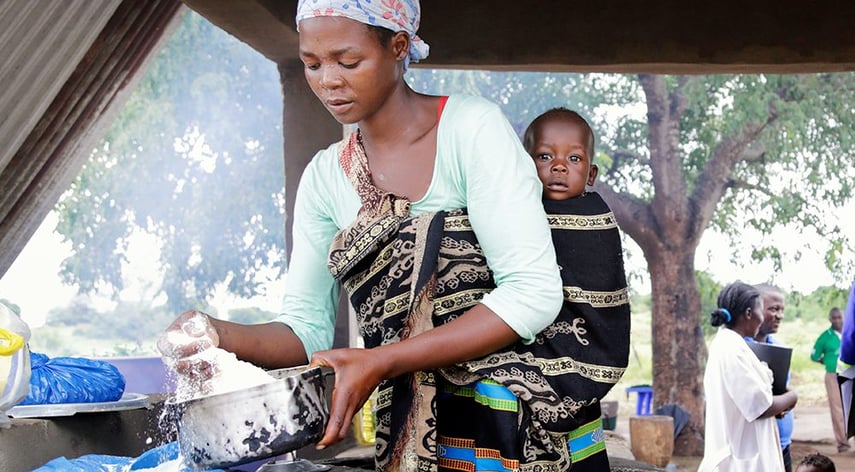
Nutrition Projects
Countries: Mozambique
.jpg?width=300&height=402&name=DSCF3880-e%20(1).jpg) Malnutrition is a widespread problem in lower-income countries and impacts children the hardest by impairing growth and development. Planet Aid is involved in two projects in Mozambique that seek to alleviate this situation by improving nutrition knowledge and practices within target communities. Through training and other outreach efforts, residents gain knowledge on the importance of eating diverse foods, learn to garden for themselves, and improve their cooking practices and processes.
Malnutrition is a widespread problem in lower-income countries and impacts children the hardest by impairing growth and development. Planet Aid is involved in two projects in Mozambique that seek to alleviate this situation by improving nutrition knowledge and practices within target communities. Through training and other outreach efforts, residents gain knowledge on the importance of eating diverse foods, learn to garden for themselves, and improve their cooking practices and processes.
Mozambique is one of the least developed nations in the world, according the United Nations’ Human Development Index. The levels of chronic malnutrition are very high with two out of five children under five suffering from chronic malnutrition.
The Planet Aid–supported Nutripesca project in the Province of Zambezia provides nutrition education to children and young women. The project utilizes a variety of avenues in helping the population understand how changes in behavior, particularly greater diet diversity, can lead to improvements in health and development. In 2018, the outreach included such things as radio broadcasts on nutrition-related topics and the development of cooking demonstrations involving different foods grown in kitchen gardens to supplement household diets. The project also organized more than 5,000 women in nutrition groups.
.jpg?width=300&height=200&name=_N4A4293-e%20(1).jpg) The other nutrition project, Food for Knowledge (FFK), is Planet Aid’s flagship comprehensive school lunch and education initiative. The project is funded by the U.S. Department of Agriculture as part of the McGovern-Dole International Food for Education and Child Nutrition Program.
The other nutrition project, Food for Knowledge (FFK), is Planet Aid’s flagship comprehensive school lunch and education initiative. The project is funded by the U.S. Department of Agriculture as part of the McGovern-Dole International Food for Education and Child Nutrition Program.
In addition to providing daily meals for students comprised of a nutritious corn and soy fortified porridge, the project trains primary school teachers; establishes school gardens and small-scale farms; creates after-school learning clubs; provides nutrition education; and helps construct and refurbish school kitchens, wells, and latrines.
In 2018, FFK also continued to serve a hot lunch to 86,000 children, with more than 9 million school lunches served during the year.
Sustainable Agriculture
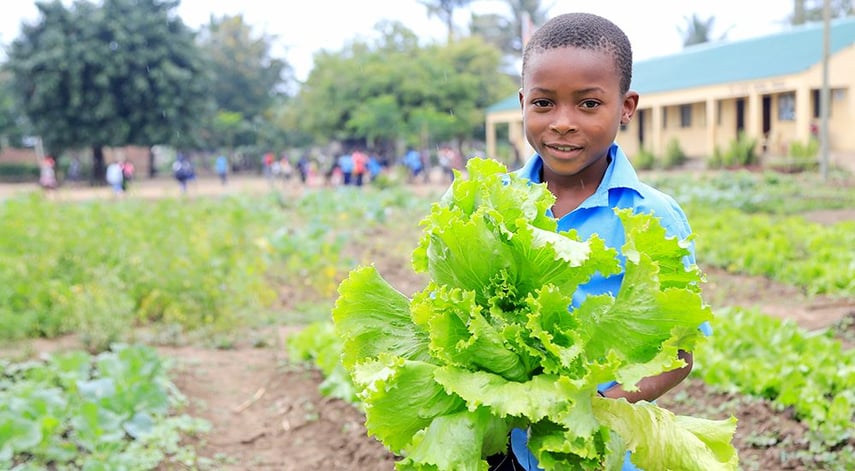
Farmers' Clubs
Countries: Belize, Brazil, the Democratic Republic of the Congo, Ecuador
.jpg?width=300&height=217&name=Brazil-Farmers-Clubs-e%20(1).jpg) Planet Aid supports over 9,000 small-scale farmers in five countries through Farmers’ Clubs, which organizes rural farmers into cooperative-like groups and trains them in conservation farming techniques and in how they can better respond to local market challenges.
Planet Aid supports over 9,000 small-scale farmers in five countries through Farmers’ Clubs, which organizes rural farmers into cooperative-like groups and trains them in conservation farming techniques and in how they can better respond to local market challenges.
One of the essential facets of the conservation farming training is how it can help them adapt to climate change and become more resilient, and have greater capacity to deal with extreme weather, especially droughts. The projects also provide technical assistance and facilitate visits among farmers so that they can share experiences on sustainable farming and low-cost solutions.
The Farmers’ Clubs are also geared toward increasing gender equality through support of women in leadership roles within the clubs and club activities. For example, the Recôncavo Farmers’ Club in Brazil has women in 70 percent of its leadership roles, leading trainings, finding markets for their products, and much more.
In 2018, Planet Aid–supported Farmers’ Clubs worked with over 6,700 farmers, increasing the income of many by 10 to 15 percent. The projects also helped plant more than 60,000 trees.
Read more about Farmers' Clubs.
Planet Aid at Home
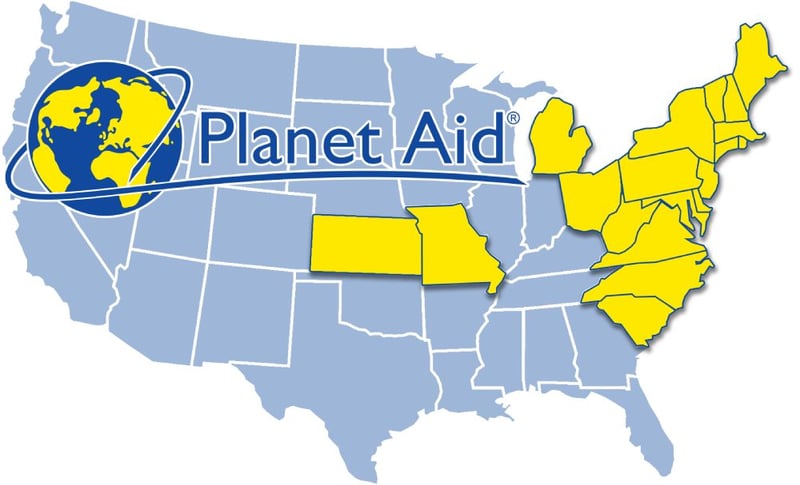
By making it more convenient for consumers to drop off their unwanted clothing, Planet Aid helps increase textile reuse and recycling rates, thereby reducing environmental impacts associated with the manufacture and disposal of textile products. In 2018, Planet Aid collected and recycled nearly 90 million pounds of clothes and shoes in the United States.
Here are a few other highlights from our work in 2018.
Planet Aid Partners with the Ohio Department of Rehabilitation and Correction
.jpg?width=420&height=278&name=20181109_141301.edit%20(1).jpg) About four years ago, Planet Aid began partnering with the Ohio Department of Rehabilitation and Correction and the Go Home to Stay Home program. The aim of the partnership is to help inmates in making a better life for themselves upon release.
About four years ago, Planet Aid began partnering with the Ohio Department of Rehabilitation and Correction and the Go Home to Stay Home program. The aim of the partnership is to help inmates in making a better life for themselves upon release.
In the following four years, the program has expanded and changed, making great strides in quaility of life for inmates. The project was featured on ABC Channel 5 News in Cleveland this past year. You can see their full story here. And, Planet Aid’s Kim Lipfird was recognized as Volunteer of the Year by Grafton Correctional Institution for with the Go Home to Stay Home program. Read more
Planet Aid Supports Kansas City Food Bank
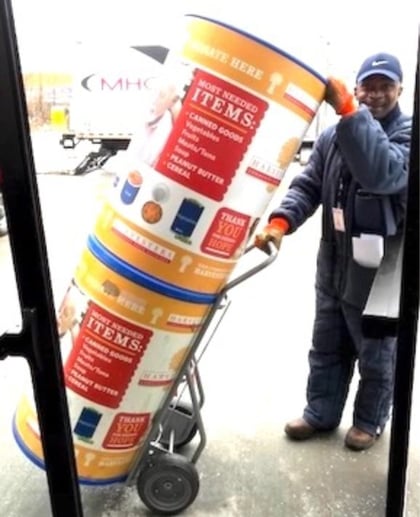
Planet Aid Kansas City is a proud partner of Harvesters, a regional food bank serving a 26-county area in northwestern Missouri and northeastern Kansas. Harvesters provides food and related household products to more than 62 nonprofit agencies, including emergency food pantries, community kitchens, homeless shelters, children’s homes, and others. Planet Aid makes donations of canned food and toiletries to Harvesters monthly.
Planet Aid and the Weekend Backpack Program
Planet Aid is partnering with the Peabody, Massachusetts public school district to bring food to elementary students in need. The public schools offer qualified elementary students complimentary breakfast and lunch, Monday through Friday, during the school year to help those families struggling to meet food needs. However, many of these children leave school Friday afternoon with no expectations for meals until the Monday morning school breakfast. To address this need for nutritious food over the weekend, The Weekend Backpack Program was initiated. Planet Aid helped with this school year’s effort by donating backpacks to the school district for the program. Read more
Planet Aid Assists Ellicott City in Cleanup Effort
.jpg?width=420&height=315&name=wbarrows%20(1).jpg)
Ellicott City, Maryland was devastated by flooding in May 2018, with much of the downtown area severely impacted. Buildings and businesses were destroyed, vehicles were washed away, and one fatality occurred. The incident made headlines around the globe.
In response to this terrible disaster, the second in two years, there was a tremendous outpouring of support from the community. Planet Aid helped in the effort with volunteers and with equipment.
People at Planet Aid
Board and Officers
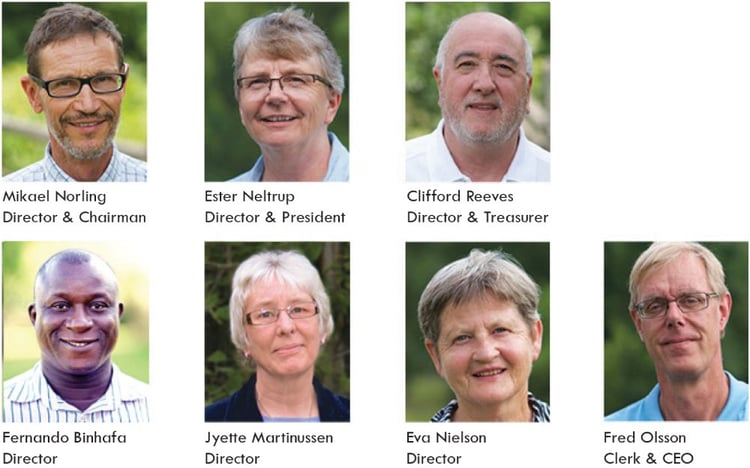
Staff Snapshots...
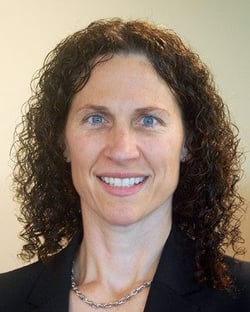 Kim Roth is Planet Aid’s corporate human resources manager. Her responsibilities include: policy implementation, training and development, recruiting, retention management, and performance management. Clearly, Kim’s primary focus is on Planet Aid staff. She meets with employees in their offices or in the warehouses at Planet Aid's various locations.
Kim Roth is Planet Aid’s corporate human resources manager. Her responsibilities include: policy implementation, training and development, recruiting, retention management, and performance management. Clearly, Kim’s primary focus is on Planet Aid staff. She meets with employees in their offices or in the warehouses at Planet Aid's various locations.
Kim has over 25 years of human resources management experience, and is certified as a senior professional by the Society of Human Resources Management. Before Planet Aid, Kim worked for a global hotel company that helped broaden her international experience.
Kim joined the Planet Aid team in July 2018. She greatly enjoys helping employees and managers excel in their roles every day. “My favorite part of being a Planet Aid employee is being a part of an organization that works to bring about worldwide environmental and social progress,” she said.
.jpg?width=250&height=333&name=Carlton-Samuels%20(1).jpg)
Carlton Samuels has been driving a Planet Aid truck for over 10 years. Based out of Ohio, he collects and transports thousands of pounds of donated textiles each year. It is critical to the Planet Aid system that collection bins are unloaded regularly and the contents are delivered to an operations center. There the donations are weighed, packed, and shipped out. Carlton’s dedication ensures this process continues seamlessly.
As a veteran driver, Carlton helps train new staff. He reassures them that driving for Planet Aid is steady work with plenty to do. “Most people don’t realize the amount of donations Planet Aid gets on a regular basis.”
Carlton is happy that his work helps prevent waste and assists those in less-developed countries. “I’m doing something that enables me to take care of my family,” he said, “but I’m also helping those in need.”
.jpg?width=250&height=399&name=Delyse-Lawless%20(1).jpg)
Delyse Lawless is the partnership specialist and proposal writer in Planet Aid's Partnership Office. She is responsible for connecting with and building relationships with potential donors in the private sector, including companies, corporate partners, and foundations.
Delyse started with Planet Aid in December of 2018, and brings with her a number of unique experiences. She spent time in Thailand teaching English, and in Liberia working with vulnerable women and children. She also has a background in education—one of Planet Aid’s focus areas—and taught communications and public speaking at universities in the States after earning her Master’s degree and a certificate in pedagogy.
“I really like that Planet Aid is doing their part to try to reduce waste on the planet,” Delyse said. She also appreciates that Planet Aid is part of a larger team, specifically the Humana People to People Federation. “I like the concept of Humana People to People, where a giant network of collaboration is empowering local NGOs to be more capable of competing with large NGOs.”

Ron Allen is the regional manager for Planet Aid’s mid-Atlantic region, which includes New Jersey, Delaware, New York, Maryland, Washington DC, Virginia, West Virginia, and North Carolina. Ron makes sure that all aspects of textile collection and shipping run smoothly at the four warehouse locations in the region. With nearly 6,300 bins under his purview that bring in nearly 33 million pounds per year, Ron has a lot on his plate.
Though relatively new to Planet Aid, Ron has a long track record managing complex logistics and warehouse distribution, and his experience in environmental recycling makes him a great addition to the Planet Aid operations team.
“I work with a great group of people dedicated to helping others less fortunate than themselves,” he said. “That end result, doing what we do to help others, inspires my work.”
Financial Statement
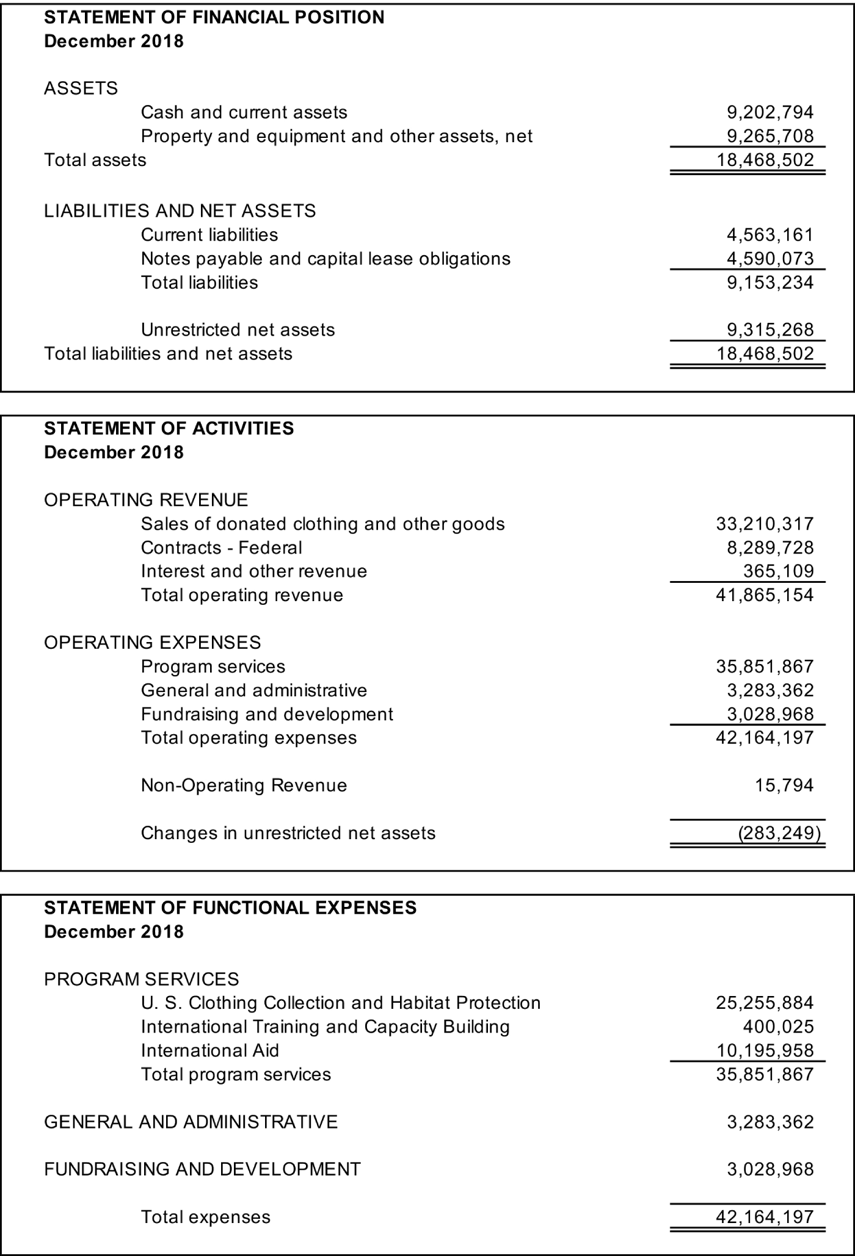
Allocation of Funds
| Task | Internal Program Support |
|---|---|
| Program Services | 85 |
| General and Administrative | 7 |
| Fundraising and Development | 8 |

